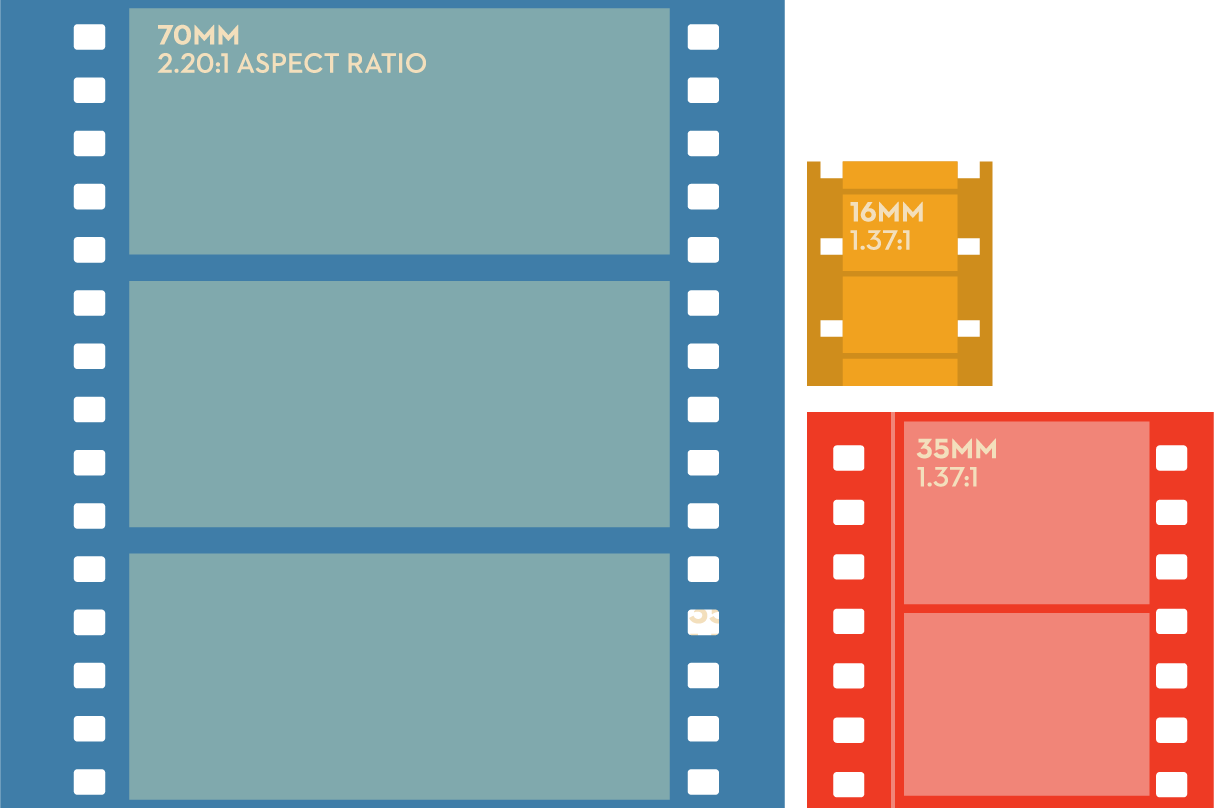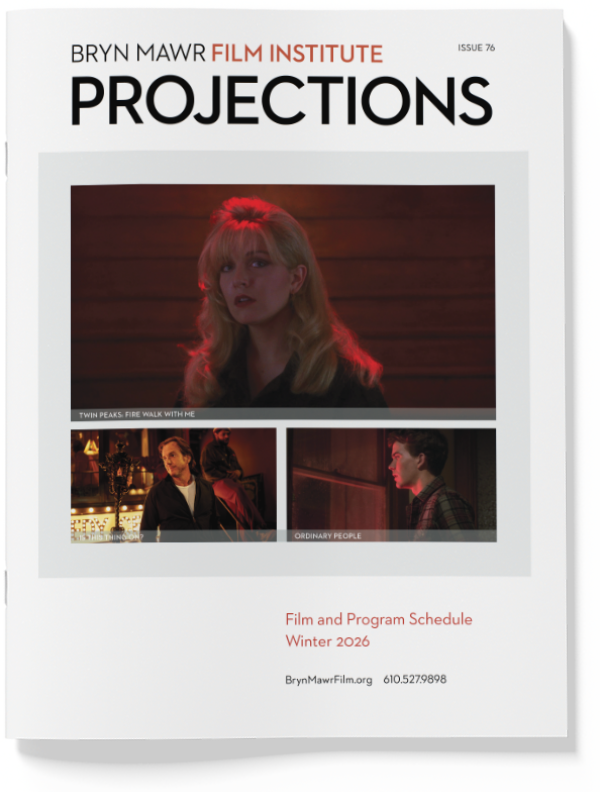We have done our best to provide answers to many frequently asked questions. If you have a question that is not answered below, please contact us for assistance.
Q: What’s the difference between digital and analog film projection?
A. For most of the medium’s history, movies were screened from physical materials—reels of celluloid printed with thousands of photographic frames. With this method, projectors shine a powerful light through the strips of film as they unwind, casting moving images onto theater screens. Wear-and-tear or damage to a film print affects the quality of the image, so they require special care and preservation. Analog film projection is often referred to with the shorthand “on film.”
In the 21st century, digital projection has become the predominant method of film exhibition. Instead of using physical prints that need to be shipped from one venue to the next, most films are played using massive digital files, encoded in a specialized format called DCP (digital cinema package) and projected using industry-grade equipment.
Q. What kind of projection does BMFI use?
A. Most movies you see at BMFI are projected digitally using our new Barco 4K laser projectors, which optimize the projected images for each screen’s shape and size. All projectors have native 4K resolution (4096 x 2190), and their laser illumination provides superior image uniformity and brightness.
BMFI is also dedicated to preserving the analog film-projection tradition. We make a point to show movies “on film” from time to time. On our website, you’ll see these screenings indicated with a film-reel icon, as seen below. The event description will include specific information about the film’s format (16mm, 35mm, 70mm, etc.).
Q. What’s the big deal about analog film projection?
A. For all the advantages of digital projection, there are many reasons why analog film projection remains a format worth showing.
One reason is the character and quality of its images. Many people feel that a good quality film print offers a richness, earthiness, and a sense of tangibility that digital cannot approximate.
It’s also a matter of preserving a connection to the medium’s history. Although most movies are distributed in digital formats these days, there were many decades where film prints were the only way to screen and preserve movies in a high-quality fashion. Some older titles have been digitized and some have even been given gorgeous digital restorations, but there remain many, many movies that exist only on film, with no quality digital materials available. Retaining the capability to screen movies on film gives us the ability to bring titles to our audience that might otherwise be impossible to see theatrically (or perhaps, at all). By maintaining the equipment and expertise to show movies on film, BMFI is doing its part to keep the cultural tradition of analog film projection alive and provide a living connection to cinema’s rich history.
Q: What is the difference between 16mm, 35mm, and 70mm film?

Film Ratios Compared
A. Film stock comes in different sizes. 16mm, 35mm, and 70mm refer to the width (or “gauge”) of the physical film strips on which movies are shot and/or projected. The larger the gauge, the larger the images—meaning more and more vibrant visual source material—that will be used to project the movie onto the screen.
16mm is a smaller format, historically used for television, commercials, documentaries, and low-budget films (although it has been used for some high-profile features). BMFI does not own a 16mm projector, but we occasionally host programs where curators bring 16mm projectors into the theater.
35mm was the format most frequently used for shooting and distributing feature films during the heyday of analog film production and projection. Most of the analog film screenings you see at BMFI will be projected from 35mm prints.
70mm is a deluxe, high-resolution format that uses film strips twice the width—and over three times the area—of 35mm, offering remarkable detail and image clarity. Commonly used for epic movies with spectacular visuals, the format originally gained popularity in the 1950s and ‘60s. During the 1990s, usage declined, and it became rare for theaters to possess the ability and equipment to project 70mm. In the last decade, directors like Quentin Tarantino, Christopher Nolan, and Paul Thomas Anderson have embraced 70mm, sparking new appreciation for the format. BMFI’s recent projection booth upgrades make it one of the few venues in our region that can screen new and classic films in this prestige format.
Q: Why do 70mm screenings have higher ticket prices?
A. Presenting 70mm screenings comes with many added expenses, from the maintenance of our equipment to the training of our projectionists to the shipping and handling costs required to transport enormous prints to and from film archives. The higher ticket price allows us to keep our gear in working order and to continue bringing these specialized viewing experiences to our audience.
Q: What is laser projection?
A: Cutting-edge digital projectors (such as ours) have replaced traditional projector lamps with new laser light sources. Laser projection brings a significant boost to image quality, offering elevated brightness, more color intensity, and deeper contrast. Pairing these state-of-the-art projectors with our brilliant white (not silver) screens—which render brighter and more vivid images—creates a superior viewing experience we call BMFI 4K Laser Cinema™. In addition, the laser light sources use less energy and have a much longer lifespan than conventional lamps, making them a more environmentally friendly and cost-effective option.
Q: What is 4K?
A: In digital projection, images are rendered using pixels—the higher the pixel count, the higher the level of detail. Many repertory titles and some new releases come to us in 2K resolution, a format using about 2.2 million pixels to render its images. 4K resolution increases the image quality by roughly a factor of four, using around 8.3 million pixels to render its images.
Q: How will I know if a movie is 4k?
A: These days, more and more new releases (as well as classic titles that have undergone restorations) are made available in 4K, and our projectors allow us to present them with the vibrancy, detail, and clarity their creators intended. Films we present in this resolution will be tagged with “4K” on our website and will display the symbol below.
Q: When will BMFI start showing movies on 70mm?
A: We are currently optimizing and mastering this new equipment. We are hoping to start showing 70mm films this spring. Stay tuned for announcements coming in early 2025.
Q: When are new movies and showtimes announced?
A: We announce our newest movies on Tuesday evenings, unless there is a delay due to a holiday or some other reason. BrynMawrFilm.org is updated in real time, making it the fastest and most accurate way to see our current schedule. You can sign up to receive our weekly schedule, which is emailed every Tuesday and includes the newest films, special screenings, and film education offerings.
Q: How long will this movie play at BMFI?
A: We’re not entirely sure. Main attraction films are booked on a week-to-week basis. If there is a new movie you want to see at BMFI, we recommend attending as early as possible, because we can’t guarantee a run for more than one week at a time.
Q: When are you going to get a new movie?
A: BMFI is contractually obligated by distributors to keep films that are well-attended and in high demand from audiences. This sometimes makes it hard to get new movies. You may view the films we hope to book soon and their expected start dates on the Coming Soon page.
Q: Do you have 15 to 20 minutes of previews?
A: No, at BMFI we only have six to eight minutes of previews before new releases. There are no previews before repertory films and special events, which begin promptly at the advertised show time.
Q: Why are your showtimes wrong online?
A: Always check BrynMawrFilm.org for the most up-to-date movie showtimes.
Q: How early should I come to make sure I get a good seat?
A: All BMFI screenings have open seating, which means patrons may select their seats on a first-come, first-served basis. To have the best chance of getting your preferred seats for popular movies on the weekends, and for special events, we recommend that you arrive twenty minutes before showtime.
Q: Where can I park?
A: Detailed parking information can be found on the Parking page of the web site.
Q: Why doesn’t anyone answer the telephone?
A: The Box Office staff cannot answer phones during the 30 minutes prior to and 15 minutes after a movie starting, as they are assisting in-theater customers with popcorn and candy sales, and finding seats in the theaters. Please leave a message and someone will call you back as soon as possible.
Q: Can I buy tickets over the phone?
A: BMFI cannot sell tickets over the phone. Tickets can be purchased online at BrynMawrFilm.org or on site at the BMFI Box Office. Mogul, Angel, and higher-level members may access their free admission benefits by logging into their accounts on BrynMawrFilm.org.
Q: How do I purchase tickets online?
A: Browse the schedule of films on BrynMawrFilm.org and select the film you would like to see. From there, select the desired show time to complete the ticket purchase.
BMFI’s refund policy can be found on the Tickets & Policies page.
Q: How old is this building? When did this theater open?
A: The 1926 theater building’s story can be found on the About page.
Q: What kind of oil do you use for your popcorn?
A: BMFI uses trans fat-free canola oil.
Q: Is your popcorn, oil, and butter kosher? Is it vegan?
A: Yes, our popcorn, oil, and butter-flavored topping are all kosher and vegan.
Q: Is the butter topping real butter?
A: The butter topping is a trans fat-free artificial butter flavor made with soybean oil.
Q: Can I bring outside food or beverages into the theater?
A: Patrons are not permitted to bring outside food and drink into the theater.
Q: How can I donate to the theater?
A: Thank you for asking! Information about the many ways to donate to BMFI and how you will be recognized for your gift can be found on the Support page or you can make a secure donation directly on our site.
Q: My group is interested in getting a donation from Bryn Mawr Film Institute. Whom do I contact about this?
A: Please request a donation through the Donation Request form. Solicitations by phone will not be considered. It is important that you submit your request 3-4 weeks before your event.

